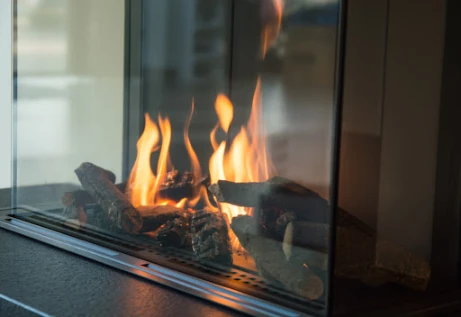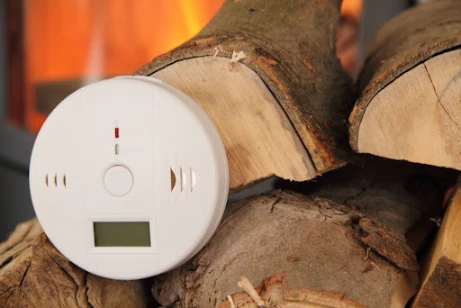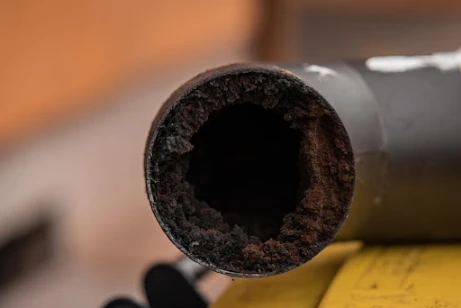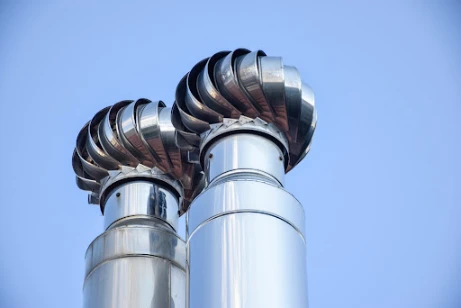Do Gas Fireplace Chimneys Need Cleaning?

Gas fireplaces are not only a source of warmth but also add a touch of coziness to our homes, particularly during the colder months. Behind the scenes, gas fireplace chimneys play a crucial role in ensuring the safe and efficient operation of these heating appliances. While many homeowners understand the importance of cleaning traditional wood-burning fireplace chimneys, it is worth considering whether gas fireplace chimneys require cleaning as well. In this article, we will delve into the necessity of cleaning gas fireplace chimneys and emphasize the significance of regular maintenance for their optimal performance and overall safety.
How Gas Fireplace Chimneys Work?
To comprehend the need for cleaning gas fireplace chimneys, it is essential to grasp the fundamental functioning of these components. Gas fireplaces utilize natural gas or propane to generate controlled flames that produce heat. During the combustion process, byproducts such as carbon monoxide, water vapor, and other gases are generated. The chimney’s primary role is to safely vent these combustion byproducts outside the house, preventing their accumulation indoors and ensuring a healthy living environment.
The Importance of Chimney Maintenance
Regular maintenance of gas fireplace chimneys is not a mere suggestion; it is a critical aspect of home safety and optimizing performance. Here are some compelling reasons why chimney maintenance is of utmost importance:
Preventing Carbon Monoxide Poisoning: Gas fireplaces produce carbon monoxide, an odorless and colorless gas that poses a significant health hazard. A well-maintained chimney guarantees the proper venting of carbon monoxide, effectively directing it out of the house. On the other hand, neglected chimneys with blockages or buildup can lead to the dangerous accumulation of this deadly gas indoors, jeopardizing the well-being of the occupants.

Ensuring Optimal Performance: Over time, gas fireplace chimneys can accumulate debris, soot, and other obstructions. These deposits restrict airflow, resulting in reduced efficiency and poor performance of the fireplace. Regular cleaning helps prevent such buildup, allowing the gas fireplace to operate at its full potential, providing effective heating and maximizing energy efficiency.
Extending Lifespan and Preventing Chimney Fires: Proper maintenance not only ensures the efficient operation of the gas fireplace but also extends its lifespan. Neglected chimneys with significant buildup increase the risk of chimney fires. The ignition of accumulated soot and debris can lead to dangerous and potentially devastating chimney fires. By keeping the chimney clean and free from obstructions, the risk of such fires is significantly reduced.
Gas Fireplace Chimney Components
A gas fireplace chimney system consists of several important components that work together to ensure proper ventilation and safe operation. Understanding these components is key to comprehending the cleaning and maintenance needs of gas fireplace chimneys. Here are the main components:
- Flue: The flue is the innermost lining of the chimney and serves as a pathway for the combustion byproducts to exit the house. It is typically made of metal, such as stainless steel or aluminum, and should be kept free from obstructions for effective venting.
- Damper: The damper is a movable plate located at the top of the firebox or inside the flue. It allows control over the airflow, enabling the fireplace to operate efficiently. It should be inspected and maintained regularly to ensure proper functioning.
- Cap: The chimney cap is installed at the top of the chimney to prevent debris, animals, and water from entering. It also acts as a spark arrestor, reducing the risk of chimney fires. Regular inspection and cleaning of the chimney cap are necessary to keep it in good condition.
Signs That Your Gas Fireplace Chimney Needs Cleaning
Recognizing the signs that indicate a gas fireplace chimney requires cleaning is of utmost importance when it comes to maintaining its efficiency and ensuring safety. By being aware of the following common indicators, you can take timely action:
Restricted Airflow: One of the primary signs that your gas fireplace chimney needs cleaning is reduced airflow or difficulties in igniting or maintaining a fire. When the chimney becomes clogged with debris, soot, or animal nests, it obstructs the proper ventilation of the fireplace. As a result, you may notice a weak flame, poor combustion, or even smoke entering the room instead of being safely expelled through the chimney.
Excessive Soot Buildup: While a thin layer of soot is normal in gas fireplaces, an excessive buildup indicates the need for cleaning. Soot is a byproduct of the combustion process, and over time, it can accumulate on the flue lining, damper, and other components of the chimney. This buildup reduces the efficiency of the fireplace, as it restricts the flow of gases and heat. Moreover, the presence of excess soot increases the risk of chimney fires, as it can ignite and cause a dangerous blaze.

Unpleasant Odors: If you notice foul odors emanating from your gas fireplace, it could be a sign of a dirty chimney. The combustion of gas produces creosote, a sticky and highly flammable substance. When creosote accumulates inside the chimney, it can create a strong, unpleasant odor. Additionally, creosote buildup can lead to the formation of harmful gases, such as carbon monoxide, which can pose serious health risks to you and your family. Addressing the cleaning of the chimney promptly is crucial to eliminate the odors and ensure a safe and healthy indoor environment.
By paying attention to these signs and promptly scheduling chimney cleaning and maintenance, you can ensure that your gas fireplace operates efficiently, reduces the risk of hazards like chimney fires, and maintains a pleasant and safe indoor environment for everyone.
Frequency of Gas Fireplace Chimney Cleaning
Determining how often your gas fireplace chimney needs cleaning depends on various factors. It is generally recommended to have your chimney inspected and cleaned annually. However, specific guidelines may vary based on the following considerations:
Frequency of Use: If you frequently use your gas fireplace during the colder months, it is likely to accumulate more soot and debris, necessitating more frequent cleaning. On the other hand, if you use it only occasionally, less frequent cleaning may be sufficient.
Type of Gas Fuel: The type of gas fuel you utilize can impact the rate of chimney buildup. Different gas fuels produce varying amounts of combustion byproducts, such as soot and creosote. To establish an appropriate cleaning schedule, consult your manufacturer’s guidelines or seek advice from a professional chimney sweep.
Manufacturer Guidelines: It is advisable to consult the owner’s manual or visit the manufacturer’s website for specific recommendations regarding chimney cleaning intervals. Gas fireplace manufacturers often provide valuable insights into maintaining the efficiency and safety of their products.
Environmental Factors: Certain environmental conditions can influence the buildup of debris in your chimney. For instance, if you reside in an area with high levels of air pollution or if your gas fireplace is exposed to excessive moisture, it may require more frequent cleaning to ensure optimal performance.
Signs of Accumulation: Regardless of the recommended cleaning schedule, it is crucial to pay attention to any signs of buildup or blockage in your chimney. If you notice excessive soot, a strong odor, reduced fireplace performance, or difficulty in starting or maintaining a fire, it indicates the need for immediate cleaning, irrespective of the regular maintenance timeline.
Additional Chimney Maintenance Tips
In addition to regular cleaning, there are several other practices you can adopt to ensure the longevity and optimal performance of your gas fireplace chimney:
Annual Inspections: It is crucial to schedule a professional chimney inspection on a yearly basis, regardless of how well your chimney seems to be functioning. During the inspection, a qualified technician will thoroughly assess the condition of your chimney, looking for any signs of damage, blockages, or structural issues. They will also inspect the chimney liner, check for proper ventilation, and ensure that all components are working efficiently. By conducting these inspections, you can detect and address any hidden problems early on, avoiding potential hazards and costly repairs in the future.
Proper Ventilation: Take care to ensure that the area surrounding your gas fireplace and chimney has adequate ventilation. Proper ventilation is essential for the efficient operation of your fireplace and for maintaining the health of your chimney. Without sufficient airflow, moisture can become trapped, leading to the formation of mold, mildew, and even rust on the chimney components. To enhance ventilation, keep furniture, drapes, or other objects at a safe distance from the fireplace. Additionally, ensure that the room has proper air circulation through windows, vents, or fans. By maintaining good airflow, you can prevent moisture-related issues and preserve the integrity of your chimney.

Use Quality Fuel: Opting for high-quality gas fuel from reputable suppliers is essential for the optimal performance and maintenance of your chimney. Clean fuel produces fewer combustion byproducts, reducing the likelihood of soot and creosote buildup inside the chimney. Soot and creosote are highly flammable and can pose a fire hazard if allowed to accumulate over time. Using clean fuel also minimizes the production of corrosive substances that can damage the chimney liner and other components. By investing in quality fuel, you can minimize the risk of chimney buildup and maintain the efficiency of your gas fireplace.
Monitor Carbon Monoxide Detectors: Install carbon monoxide detectors in your home, preferably near sleeping areas and on every level of your house. These devices are designed to detect the presence of carbon monoxide gas, which is a byproduct of incomplete combustion. Carbon monoxide is colorless, odorless, and highly toxic, making it crucial to have early warning systems in place. Regularly test and check the batteries of your carbon monoxide detectors to ensure they are functioning properly. If a detector sounds an alarm or indicates the presence of carbon monoxide, evacuate the premises immediately and contact emergency services. By diligently monitoring carbon monoxide levels, you can protect yourself and your family from this silent threat.
By conscientiously incorporating these additional maintenance tips into your routine, you can significantly extend the lifespan of your gas fireplace chimney. Moreover, you will be actively safeguarding the safety and efficiency of your heating system, allowing you to enjoy a comfortable and worry-free environment in your home. Regular inspections, proper ventilation, using quality fuel, and monitoring carbon monoxide detectors all play vital roles in maintaining a well-functioning chimney and ensuring the well-being of your household.
Some General FAQs
Yes, gas fireplace chimneys do need cleaning. Although gas fireplaces produce less creosote and soot compared to wood-burning fireplaces, other byproducts such as debris, dust, and animal nests can accumulate in the chimney. Over time, these materials can obstruct the venting system, affecting the fireplace’s efficiency and potentially causing health and safety concerns.
Yes, gas fireplace chimneys need to be cleaned. Regular cleaning is essential to remove debris and obstructions from the chimney, ensuring proper venting of combustion byproducts. It is recommended to have a professional chimney sweep inspect and clean the chimney at least once a year, or as per the manufacturer’s guidelines.
Yes, chimneys for gas fireplaces need to be cleaned. Although the type of residue may be different, gas fireplaces still produce byproducts that can accumulate in the chimney. Regular cleaning helps prevent blockages, maintain efficient airflow, and reduce the risk of carbon monoxide buildup or chimney fires.
Yes, chimneys with gas fireplaces require cleaning. Regardless of the type of fireplace, the chimney serves as the venting system for combustion byproducts. Over time, the chimney can accumulate debris, animal nests, or other obstructions, impairing the chimney’s function and potentially causing safety hazards. Cleaning the chimney ensures proper venting and maintains the fireplace’s performance.
Yes, gas fireplaces need chimney cleaning. Although gas fireplaces produce fewer byproducts, regular maintenance, including chimney cleaning, is still necessary. Cleaning the chimney helps remove any buildup or obstructions that can hinder the venting process and affect the fireplace’s efficiency and safety.
Yes, natural gas fireplace chimneys need to be cleaned. Whether a gas fireplace runs on natural gas or propane, the combustion process generates byproducts that can accumulate in the chimney. Regular cleaning ensures the proper functioning of the chimney and reduces the risk of venting issues or safety hazards.
Yes, you need to have a gas fireplace chimney cleaned. Cleaning the chimney is an important part of fireplace maintenance. It helps remove any debris, obstructions, or buildup that can hinder the venting process and compromise the fireplace’s performance and safety. Hiring a professional chimney sweep is recommended to ensure thorough cleaning and inspection.
Yes, gas fireplaces need to have the chimney cleaned. Regular cleaning of the chimney is necessary to maintain the proper operation of the fireplace. Cleaning helps prevent blockages, remove debris, and ensure efficient venting of combustion byproducts. It is advisable to have a professional chimney sweep inspect and clean the chimney on a regular basis.
In conclusion, regular cleaning and maintenance of gas fireplace chimneys are crucial for a safe and functional heating system. By prioritizing chimney maintenance, you can enjoy the warmth and comfort of your gas fireplace while ensuring the well-being of your household. Remember, a well-maintained chimney not only enhances the performance of your gas fireplace but also provides peace of mind for you and your loved ones.

